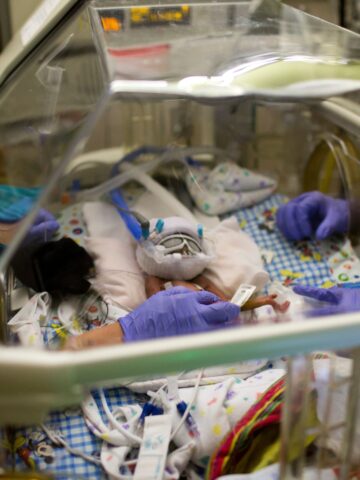Seventeen-year-old Carson comes from a close-knit family of athletes and had been playing baseball for a decade when consistent, unexplained pain left his family stumped and looking for answers. The next 18 months were filled with countless physical therapy and orthopedic appointments. When an MRI of his spine lead the radiologist to assume they were from a middle-aged person who’d played a lifetime of contact sports, rather than a 15-year-old boy, finally the family had a clue that Carson’s pain was not just an overuse injury.
At the time, pre-diagnosis, Carson was traveling a couple hours roundtrip every few days for orthopedic appointments related to wrist, elbow and shoulder pain.
He was ultimately referred to Dr. Andrew Shulman, a CHOC pediatric rheumatologist, and finally Carson’s family had the answers they’d been seeking for years. Carson was diagnosed with Juvenile Ankylosing Spondylitis, a form of arthritis that affects the spine and sites where muscles, tendons and ligaments attach to bones in the body. Juvenile Ankylosing Spondylitis is diagnosed in 1 in every 50-100,000 children per year.
He was also diagnosed with Pain Amplification Syndrome, a condition in which patients develop abnormal pain sensitivity. The nervous system processes normal sensations from movement and environmental experience as pain signals.

Looking back as far as middle school, a lot of Carson’s issues were tied to this condition. He had tried everything from water therapy to hypnosis, but nothing worked. Then Dr. Shulman recommended acupuncture, and Carson’s mom Andrea explains how Ruth McCarty, director of Chinese medicine and acupuncture at CHOC, was ‘unbelievable in getting Carson to a good place.’
Additionally, Carson’s multidisciplinary care team includes physical therapist Robin Beauregard and pediatric gastroenterologist Dr. Mitchell Katz. Carson’s family is also a key component of his care team.
“Dealing with these diagnoses is a team effort,” says Carson. “My dad carries me up the stairs when my Pain Amplification Syndrome flares up and I can’t walk, and I squeeze his hand during Humira injections. My mom helps me mentally, and she’s made this so much easier to manage. Dr. Shulman has given us a path forward.”
Despite still making his school’s baseball team while fighting a dual diagnosis, Carson could no longer cope with the week or two of pain that came with playing a single inning. Now he works out daily in a gym whether he’s experiencing a flare up or not, which helps with both diagnoses. To fill the void that competitive baseball left, he often plays catch with his friends and former teammates.
“Carson’s journey with arthritis is a powerful one. It speaks to the importance of diagnosing arthritis, and the outcomes we can achieve with therapy,” says Dr. Shulman. “His experience shows that multidisciplinary care has been transformative.”
Dr. Shulman offers the following guidelines on when to refer for further evaluation:
- Persistent joint swelling, stiffness, limited range of motion.
- Musculoskeletal pain not responding to rest, supportive care, modification of activity and exercise.
For a full list of referral guidelines, click here. To contact Dr. Shulman, please call 714-509-8617.




